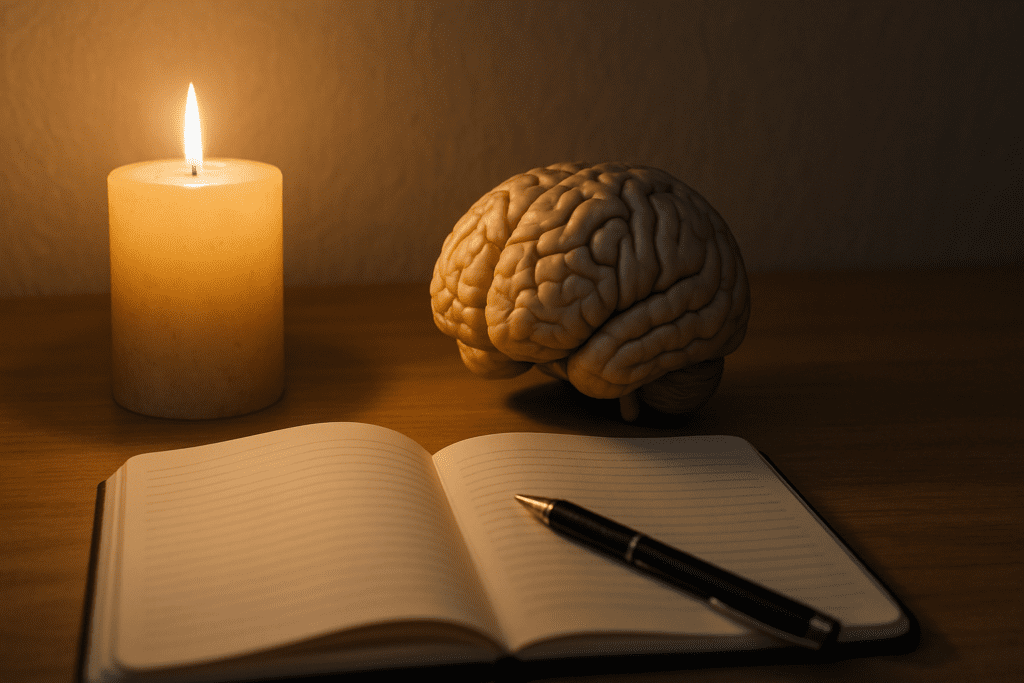In a world marked by constant stimulation, multitasking demands, and digital overload, the ability to focus deeply and consistently has become a prized—yet increasingly rare—skill. For those navigating this relentless cognitive terrain, meditation offers a time-honored remedy that is receiving renewed scientific validation. Among the many meditative practices emerging as tools for cognitive resilience, focused attention meditation stands out for its direct and measurable benefits on concentration, memory, and overall brain function. This article delves into the mechanisms, benefits, and practical applications of focused attention meditation, showing how it can enhance concentration and bolster long-term brain health in profound ways.
You may also like: How to Improve Focus at Work Naturally: Science-Backed Techniques to Boost Mental Clarity and Long-Term Brain Health
Understanding the Science Behind Focused Attention Meditation
Focused attention meditation, often referred to simply as focus meditation, is a form of mental training where attention is directed toward a single object—such as the breath, a mantra, or a visual point of reference. When distractions arise, the practitioner gently returns their focus to that chosen anchor. While this may sound simple, it actually activates and strengthens complex neural circuits associated with attention regulation, emotional control, and executive function.
Neuroscientific studies using fMRI imaging have demonstrated that engaging in focused attention meditation stimulates the prefrontal cortex—the brain region responsible for planning, decision-making, and sustained attention. At the same time, it reduces activity in the default mode network (DMN), a system linked to mind-wandering and self-referential thinking. By decreasing DMN activation and increasing connectivity in attentional networks, focused meditation effectively trains the brain to resist distractions and maintain cognitive clarity. This neuroplasticity—the brain’s capacity to rewire itself—is particularly significant when we consider the role of attentional control in preserving cognitive health over the lifespan.
How Meditation for Concentration Supports Mental Clarity
One of the primary reasons people turn to meditation for concentration is the pressing need to sharpen their mental clarity, especially in environments filled with constant interruptions. The practice of returning attention to a single point again and again cultivates what cognitive scientists call “selective attention”—the ability to focus on relevant stimuli while filtering out distractions. Over time, this selective attention becomes more efficient, enabling practitioners to engage more fully with their tasks and remain present even in high-stress situations.
Moreover, studies have shown that even short-term meditation training can lead to measurable improvements in attention span. For instance, research published in the journal Psychological Science found that participants who engaged in focused attention meditation for just two weeks showed better performance on tasks requiring sustained attention and working memory. These findings suggest that meditation is not merely a relaxation technique but a powerful cognitive enhancer capable of strengthening the brain’s attentional systems.
Long-Term Brain Health Benefits of Focus Meditation
While the immediate benefits of focus meditation—such as reduced stress and enhanced mental clarity—are well-documented, its long-term effects on brain health are equally compelling. Regular practice has been associated with increased cortical thickness in areas responsible for attention, emotional regulation, and memory. This structural change is significant because cortical thinning is commonly observed in aging populations and those with neurodegenerative diseases.
Furthermore, meditation appears to reduce inflammation and oxidative stress, two major contributors to cognitive decline and neurodegeneration. Through its influence on the hypothalamic-pituitary-adrenal (HPA) axis, focus meditation modulates stress hormone levels, which in turn protects the brain from the deleterious effects of chronic cortisol exposure. Some longitudinal studies even suggest that long-term meditators may experience slower age-related decline in attention and executive function, indicating that meditation could serve as a preventive measure against age-related cognitive disorders.

Mechanisms That Make Focused Attention Meditation Effective
What makes focused attention meditation uniquely effective is its reliance on deliberate cognitive engagement. Unlike passive forms of relaxation, this form of meditation requires active participation of the brain’s attentional networks. When the mind wanders—a natural occurrence—it must be reined back in, a process that exercises the brain much like a muscle. Each redirection of focus strengthens neural pathways responsible for sustained attention and impulse control.
This iterative process of losing and regaining focus is more than just a mental tug-of-war. It engages the anterior cingulate cortex, a region implicated in error detection and conflict monitoring. Repeated engagement of this area improves the brain’s ability to detect distractions and self-correct. Additionally, the insula—associated with interoceptive awareness—becomes more active, enhancing one’s ability to notice subtle changes in internal states. These neural enhancements contribute to more effective emotional regulation, reduced anxiety, and an increased capacity for reflection and intentional action.
Practical Techniques for Incorporating Meditation into Daily Life
While the neuroscience behind meditation for concentration is compelling, its real power lies in practical application. Fortunately, this form of meditation does not require an elaborate setup or extended retreats. It can be integrated into everyday routines in short, manageable sessions. Starting with five to ten minutes of daily practice is enough to begin experiencing benefits. Simply sitting quietly, closing the eyes, and focusing on the sensation of breathing can serve as a foundational exercise. When thoughts intrude, they are acknowledged and released, with the attention redirected to the breath.
As consistency is more important than duration, establishing a regular meditation routine—such as practicing first thing in the morning or before bed—can help anchor the habit. For those who struggle with self-guided practice, mobile apps and guided meditations can provide helpful structure and accountability. Over time, practitioners often find that the act of returning to the present moment becomes second nature, influencing not only formal practice sessions but also their interactions, decision-making, and emotional responses throughout the day.
Focused Attention Meditation and Cognitive Resilience in Aging
One of the most promising areas of research is the impact of focused attention meditation on aging populations. Cognitive resilience—the brain’s ability to maintain function despite age-related changes or challenges—is increasingly seen as modifiable through lifestyle factors. Meditation offers a unique intervention by targeting both biological and psychological pathways implicated in cognitive decline.
Older adults who engage in focus meditation show improved memory recall, better verbal fluency, and enhanced attentional control. Importantly, these improvements are not limited to subjective experiences but are supported by changes in neuroimaging studies, which show increased gray matter density in the hippocampus and prefrontal cortex. These areas are critical for memory formation, decision-making, and problem-solving—all functions that tend to decline with age. By strengthening these neural regions, meditation offers a proactive strategy for maintaining independence and quality of life in later years.
Additionally, meditation has been shown to reduce risk factors associated with cognitive deterioration, including hypertension, depression, and chronic stress. Since these conditions are often interconnected and can exacerbate each other, the holistic nature of meditation makes it especially beneficial. It provides not only cognitive benefits but also emotional balance and improved physiological health, creating a robust foundation for healthy aging.
How Focus Meditation Enhances Emotional Regulation and Decision-Making
Another key benefit of focus meditation lies in its ability to enhance emotional intelligence and improve decision-making. These effects are closely linked to improvements in attention and impulse control. When individuals develop greater awareness of their internal states and learn to pause before reacting, they gain the capacity to respond rather than react to challenges. This shift toward intentionality is invaluable in both personal and professional domains.
Focused attention meditation helps reduce emotional reactivity by decreasing amygdala activation—the brain’s threat-detection center. At the same time, it enhances activity in the prefrontal cortex, which governs executive function and long-term planning. As a result, practitioners are better able to assess situations rationally, weigh consequences, and make decisions aligned with their goals and values. These improvements not only contribute to mental clarity but also foster a sense of agency and confidence.
Research has also shown that individuals who meditate regularly exhibit increased empathy and compassion, both for themselves and others. These traits are associated with higher levels of psychological resilience and social connectedness, which in turn support mental health and cognitive longevity. Emotional intelligence, often underestimated in discussions of brain health, plays a crucial role in protecting against stress-related cognitive decline and promoting meaningful engagement with life.

The Role of Focused Attention Meditation in Neuroplasticity and Brain Regeneration
One of the most exciting developments in neuroscience is the discovery that the adult brain is not fixed but highly plastic. Neuroplasticity refers to the brain’s ability to reorganize itself by forming new neural connections. Focused attention meditation leverages this adaptability, facilitating structural and functional changes that enhance cognition and emotional regulation.
Studies using structural MRI have found that long-term meditation practitioners exhibit increased volume in brain regions associated with attention, memory, and sensory processing. These changes are not only measurable but are also correlated with improvements in behavioral performance. For example, meditators often score higher on tasks assessing working memory, response inhibition, and task-switching ability. These skills are essential for adapting to new information, solving problems, and maintaining focus in dynamic environments.
Moreover, focused meditation may support neurogenesis—the growth of new neurons—in the hippocampus, an area critical for learning and memory. While more research is needed in this area, early findings suggest that meditation could play a role in slowing or even reversing age-related cognitive decline. This regenerative potential, combined with the low risk and high accessibility of meditation, positions it as a powerful tool for lifelong brain health.
Meditation for Concentration in Academic and Professional Performance
In academic and workplace settings, the ability to focus deeply and retain information is critical for success. Meditation for concentration has been shown to improve not only task performance but also creativity and stress management. By reducing mental clutter and enhancing clarity, meditation allows individuals to work more efficiently and produce higher-quality outcomes.
For students, meditation can be particularly beneficial during high-pressure periods such as exams or major projects. It helps calm anxiety, improve sleep quality, and increase resilience to distractions. Similarly, professionals who engage in focused meditation report fewer errors, better time management, and improved interpersonal communication. These benefits stem not just from increased attention but also from a more balanced emotional state and greater self-awareness.
Organizations are increasingly recognizing the value of meditation in boosting productivity and well-being. Many forward-thinking companies now offer mindfulness programs as part of their wellness initiatives, helping employees harness the cognitive and emotional benefits of meditation to thrive in demanding environments. These programs are not only cost-effective but also demonstrate long-term returns in terms of employee engagement, retention, and overall performance.
Frequently Asked Questions: Focused Attention Meditation, Concentration, and Brain Health
1. How can focused attention meditation help in managing digital distraction in high-tech environments?
In today’s fast-paced digital world, the constant pings of smartphones, alerts from email platforms, and algorithm-driven notifications often fragment attention. Focused attention meditation trains the brain to resist these distractions by cultivating an internal locus of control. Rather than being driven by external stimuli, individuals learn to engage their attention intentionally and refocus quickly after interruptions. This proves especially useful in high-tech workspaces where cognitive fatigue can accumulate rapidly. By practicing focus meditation daily, users can reduce the cognitive cost of task-switching and maintain mental endurance in digitally saturated environments.
Moreover, meditation for concentration can reinforce boundaries between deep work and shallow engagement. As practitioners become more aware of their attention, they are better equipped to recognize and redirect habits such as compulsive screen-checking. With time, this helps establish more deliberate patterns of interaction with technology. Professionals in tech-heavy roles, such as programmers or analysts, often find that implementing focused attention meditation into their routines helps them enter and sustain “flow states” more consistently. These cognitive improvements translate into tangible productivity gains, making meditation not just a wellness practice, but a strategic advantage.
2. What role does focused attention meditation play in enhancing creativity?
While focus and creativity may seem like opposite qualities, they are deeply intertwined. Focused attention meditation provides the cognitive foundation for creative thought by reducing mental noise and clarifying internal perception. When the mind is scattered, it becomes difficult to form novel associations or follow abstract lines of inquiry. Through meditation for concentration, individuals gain the mental stillness needed to generate original ideas and approach problems from unique perspectives. This clarity paves the way for what researchers call “incubation periods,” where creative insights emerge after periods of focused attention followed by release.
Additionally, focus meditation improves metacognition—the ability to think about one’s own thinking. This self-awareness enables individuals to notice when they’re stuck in rigid thought patterns and gently shift toward more open, exploratory frameworks. Artists, writers, and designers often report that engaging in focused attention meditation before brainstorming sessions helps them access deeper, more innovative layers of thought. Unlike chaotic bursts of inspiration, the creativity cultivated through meditation is more sustainable and readily accessible. It fosters a mindset of curiosity and non-judgment, both of which are essential for authentic creative expression.
3. Can meditation for concentration support recovery from burnout and mental fatigue?
Absolutely. One of the lesser-known but deeply valuable aspects of meditation for concentration is its role in burnout recovery. Burnout often stems from prolonged stress, emotional depletion, and cognitive overload—all of which impair the brain’s ability to focus and self-regulate. Focused attention meditation offers a structured, evidence-based approach to reversing these effects by strengthening executive control and reestablishing cognitive balance. As individuals practice returning their focus to a central anchor, such as the breath, they gradually rebuild mental stamina that has been eroded by chronic stress.
More importantly, meditation helps recalibrate the nervous system. Burnout often leaves the body in a perpetual state of fight-or-flight, governed by an overactive sympathetic nervous system. Focus meditation activates the parasympathetic branch, responsible for rest and recovery, allowing for physiological repair and emotional stabilization. Individuals recovering from high-demand professions—such as healthcare, education, or emergency services—often find that even short sessions of focused attention meditation foster a renewed sense of mental spaciousness and emotional clarity. Over time, this cognitive restoration enables deeper healing and more meaningful re-engagement with work and life.
4. How does focused attention meditation impact interpersonal communication and empathy?
Though often associated with internal focus, focused attention meditation can significantly enhance interpersonal dynamics. By sharpening present-moment awareness, meditation for concentration allows individuals to be more attuned during conversations. Instead of formulating a response while someone else is speaking, practitioners become skilled at active listening, which enhances both understanding and empathy. This shift from reactive to responsive communication creates space for more thoughtful dialogue and emotional connection.
Furthermore, consistent practice of focus meditation builds patience and emotional regulation. These qualities are essential in conflict resolution, where staying grounded can prevent escalation and foster mutual respect. Brain imaging studies reveal that focused attention meditation increases gray matter density in the insula and anterior cingulate cortex—areas associated with emotional awareness and empathy. This neurological change supports a more compassionate worldview, making it easier to relate to others’ experiences without becoming overwhelmed. In leadership roles especially, the ability to listen deeply and respond thoughtfully can foster stronger teams and healthier organizational culture.
5. Is there an ideal time of day to practice meditation for concentration for optimal results?
The timing of your practice can influence the benefits of meditation for concentration, though the best time often depends on individual lifestyle and goals. Morning practice helps set a calm, focused tone for the day and primes the brain for sustained attention during work or study. Practicing focused attention meditation in the morning has also been shown to reduce anticipatory stress, which can otherwise drain cognitive resources before the day even begins. For those with demanding schedules, a short morning session can act as a mental anchor, stabilizing attention and emotional regulation.
On the other hand, evening sessions can help process the day’s mental clutter and support restorative sleep. Focus meditation before bed may reduce rumination and hyperarousal, both of which interfere with sleep quality. People with irregular routines might also benefit from “micro-meditations”—short bursts of focused attention between tasks—to reset mental clarity. Ultimately, consistency is more important than timing. Whether practiced at dawn or dusk, meditation for concentration becomes more effective as it becomes integrated into the rhythm of daily life.
6. How does focused attention meditation differ from mindfulness meditation, and does it matter?
While they share common roots, focused attention meditation and mindfulness meditation serve slightly different cognitive functions. Focused attention meditation involves directing the mind to a single point of concentration, such as the breath or a sound, and bringing it back whenever it wanders. This process strengthens attentional control and reduces mental fragmentation. In contrast, mindfulness meditation invites open, nonjudgmental awareness of all present-moment experiences, without necessarily narrowing focus to a single object.
The difference matters depending on your goals. If you’re struggling with distractions or mental agitation, focused attention meditation may offer more immediate improvements in sustained concentration. Over time, it can prepare the mind for more open monitoring practices like mindfulness. Some practitioners find that combining both methods provides a balanced training of attention and awareness. For those new to meditation, starting with focus meditation can help build the mental discipline needed for longer and more complex mindfulness sessions. Understanding this distinction allows individuals to choose the practice that best suits their personal or professional needs.
7. What advanced techniques can deepen the effects of focus meditation beyond basic breath awareness?
Once a foundational practice is established, advanced techniques can significantly deepen the benefits of focus meditation. One such method is “object visualization,” where attention is directed to a mental image—such as a candle flame or a sacred symbol. Maintaining clarity of this image requires sustained effort and sharpens visual-spatial attention. Another approach involves mantra repetition, where a word or phrase is mentally repeated to synchronize attention and breath. These variations prevent habituation and offer fresh cognitive challenges that further strengthen attentional circuits.
Additionally, some advanced practitioners incorporate “interoceptive tracking”—focusing on internal bodily sensations like heartbeat or energy flow. This enhances somatic awareness and deepens the connection between mind and body. Neurofeedback and biofeedback technologies are also emerging as tools to refine focus meditation by providing real-time data on brainwave activity. These innovations help meditators adjust their practice with precision and accelerate learning. As the field evolves, practitioners are gaining access to increasingly sophisticated tools that amplify the mental and neurological benefits of meditation for concentration.
8. Can focused attention meditation be adapted for children and adolescents?
Yes, focused attention meditation can be highly beneficial for younger populations, especially as childhood and adolescence are critical periods for cognitive and emotional development. However, adaptations are necessary to ensure that practices are developmentally appropriate. Instead of extended silent sessions, children might benefit from short, guided exercises involving sound, movement, or storytelling that encourage focused attention in a playful way. For example, asking a child to sit quietly and listen to the sound of a bell until it fades can introduce the principles of focus meditation in an engaging format.
In school settings, regular brief sessions of meditation for concentration have been linked to improved academic performance, reduced anxiety, and better behavior regulation. Adolescents, in particular, can use focus meditation to manage peer pressure and emotional volatility, helping them develop more mature decision-making skills. The key is to create supportive environments where meditation is framed not as discipline, but as a tool for self-discovery and resilience. Integrating focused attention meditation into early education curricula may hold promise for fostering lifelong mental health and cognitive agility.
9. How does consistent practice of focus meditation influence habits and behavioral change?
Consistent practice of focus meditation has a profound impact on behavioral patterns by enhancing self-regulation and impulse control. Habits are often formed through unconscious repetition, triggered by stress or emotional reactivity. Meditation for concentration interrupts these automatic loops by increasing moment-to-moment awareness. As individuals become more attuned to internal cues, they can intervene before reacting, making deliberate choices instead of following ingrained habits.
Over time, this conscious intervention builds what psychologists refer to as “response flexibility”—the ability to pause and choose rather than react. Whether it’s breaking a pattern of emotional eating, reducing procrastination, or fostering healthier communication, focused attention meditation provides the cognitive space necessary for lasting change. Research also indicates that as attentional stability increases, so does goal-directed behavior, making it easier to follow through on commitments. By consistently cultivating this practice, individuals can rewire the brain’s reward systems and establish more adaptive behavioral routines that align with long-term well-being.
10. What emerging research trends are expanding our understanding of focused attention meditation?
Recent research is uncovering exciting new frontiers in our understanding of focused attention meditation, especially through neuroimaging and computational modeling. Studies now suggest that focus meditation not only enhances static brain structures but also improves dynamic brain connectivity—how regions of the brain communicate in real time. This has profound implications for treating attention disorders like ADHD, where functional connectivity is often impaired. Researchers are also exploring how individual differences, such as genetic predisposition or personality traits, influence the effectiveness of meditation for concentration.
Another promising trend involves the integration of artificial intelligence and wearable technologies to personalize meditation practices. These innovations allow for real-time feedback and adaptive learning, making focused attention meditation more accessible and data-driven. There’s also growing interest in how meditation intersects with other therapies, such as cognitive behavioral therapy (CBT) or pharmacological interventions, to enhance treatment outcomes. As scientific tools become more precise, the nuanced effects of focus meditation on cognition, emotion, and behavior will continue to be revealed. This expanding body of knowledge reaffirms the value of meditation not just as a wellness tool, but as a legitimate field of cognitive enhancement and mental healthcare.

Conclusion: Cultivating Cognitive Vitality Through Focused Attention Meditation
In an era when distractions are abundant and cognitive overload is a common complaint, focused attention meditation offers a grounded, evidence-based approach to restoring mental clarity and enhancing brain health. Through its effects on attention regulation, emotional stability, and neural resilience, focus meditation emerges as a practical and powerful ally in the pursuit of cognitive vitality.
By engaging in meditation for concentration, individuals can improve their ability to stay present, make thoughtful decisions, and adapt to life’s challenges with greater ease. These benefits extend well beyond the meditation cushion, influencing every area of life—from academic performance and career success to emotional well-being and healthy aging. As research continues to unveil the profound neurological changes associated with focused attention practices, it becomes increasingly clear that meditation is not merely a wellness trend but a foundational tool for lifelong cognitive health.
Ultimately, the choice to practice focused attention meditation is an investment in one’s future—a commitment to cultivating clarity, resilience, and sustained brain function in a world that desperately needs it.
mental focus training, improve concentration naturally, brain training exercises, cognitive enhancement techniques, stress reduction strategies, attention span improvement, neuroplasticity and brain health, meditation benefits for the brain, enhance executive function, age-related cognitive decline prevention, brain longevity tips, increase mental clarity, attention control techniques, mindfulness for productivity, emotional regulation practices, workplace meditation habits, cognitive resilience strategies, meditation and neurogenesis, improve memory with meditation, decision-making and mindfulness
Further Reading:
Here are reasons you may have trouble staying focused
How to use focused attention meditation to boost concentration
12 Long-Term Effects of Meditation on the Brain
Disclaimer
The information contained in this article is provided for general informational purposes only and is not intended to serve as medical, legal, or professional advice. While Health11News strives to present accurate, up-to-date, and reliable content, no warranty or guarantee, expressed or implied, is made regarding the completeness, accuracy, or adequacy of the information provided. Readers are strongly advised to seek the guidance of a qualified healthcare provider or other relevant professionals before acting on any information contained in this article. Health11News, its authors, editors, and contributors expressly disclaim any liability for any damages, losses, or consequences arising directly or indirectly from the use, interpretation, or reliance on any information presented herein. The views and opinions expressed in this article are those of the author(s) and do not necessarily reflect the official policies or positions of Health11News.


